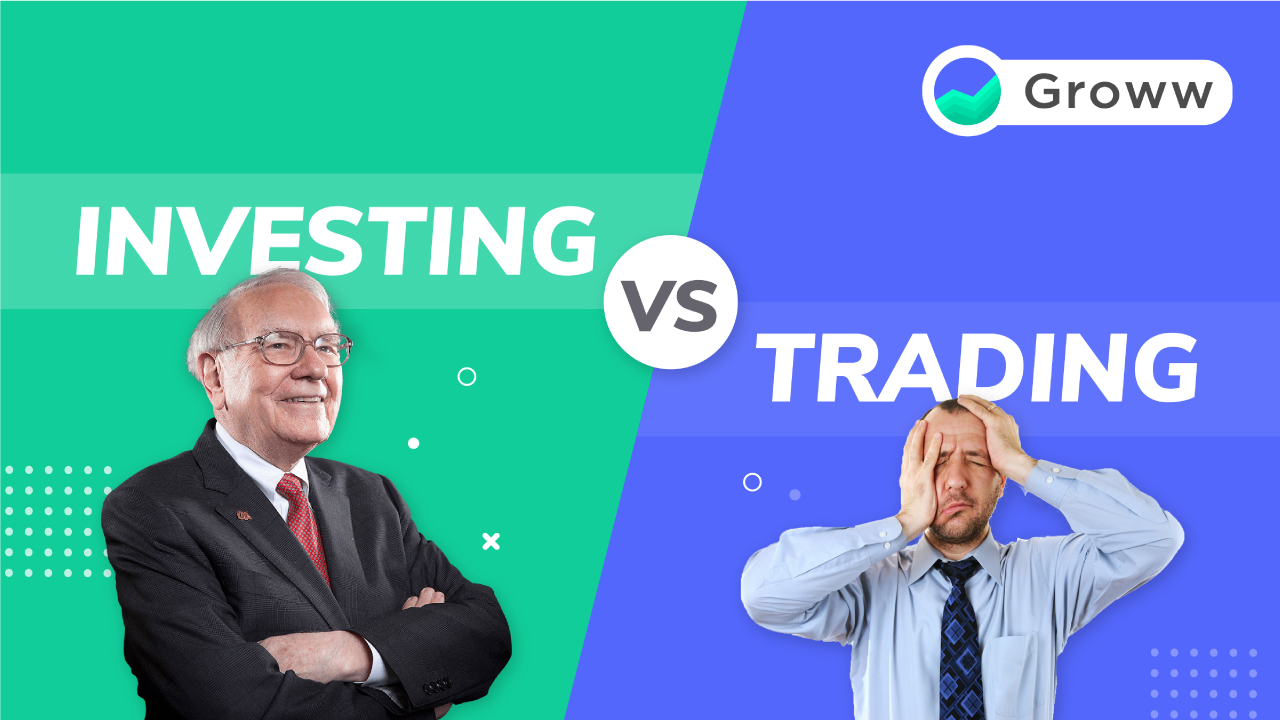Differences Between Stock Investing and Trading

Can you relate stock market investments with a cricket match? Yes! A T20 match is similar to trading, and a Test Match represents investing.
Surely, you must have gathered a basic idea of trading and investing from the above example. You should also notice the difference in the approach between the two. Let’s start our match, Investing vs. Trading, and see who wins!
What is Stock Market Investing?
In the words of Warren Buffett, ‘If you don’t find a way to make money while you sleep, you will work until you die.’ When you purchase a stock with a long-term horizon, it is called investing. As the company grows, the value of your investment also grows. This is called passive income. Your investment grows even when you are on a break, enjoying your holidays.
Remember the long Rahul Dravid test innings that were full of grit and consistently leaving easy put-away options? He broke monumental records only by staying patiently at the pitch. Similarly, holding your investments for the long term can fetch much better returns.
With regular investing habits, you can earn from regular dividends and bonus pay-outs along with your growing portfolio. Moreover, the risk of losing your money is reduced in the long term. This is the essence of investing.
Types of Investing
- Value Investing – This approach aims at reducing the risk to maintain the value of the investment. Investors purchase shares of only well-established companies. There is less growth in this approach.
- Growth Investing – This approach focuses on growing the value of investments. Investors purchase stocks that have higher growth potential. This increases the risk quotient as well as the growth prospects.
What is Stock Market Trading?
Stock trading is a sophisticated art of finding short-term mispricings in the market prices and capitalizing on them. Traders make short-term positions in stocks that range from seconds to months.
The T20 innings of Virender Sehwag are a classic example of a trader. The approach is consistently aggressive, and a trader constantly searches for opportunities to score at every instance, just like a T20 batsman. The risk with trading is much higher than with investing because of a reduced margin for error.
Types of Trading
- Position Trading: These traders buy a stock and hold it for a few months. They look for the best selling opportunities within this span to gain from.
- Swing Trading: These traders purchase a stock for days or weeks to gain from the anticipated upward movement.
- Day Trading: Day traders buy stocks in the morning and sell them before the market closes. The idea is to capitalize on a single-day rally caused by positive news or market sentiment.
- Scalp Traders: Scalp traders keep high margins in play to gain from the smallest possible price changes. These traders buy a stock for a few seconds or a few minutes. They make a profit out of the tiniest opportunity.
Main Differences between Investing and Trading
The differences between investing and trading can be understood by considering 5 factors. Let’s see them in detail.
- Risk involved
| Investing | Trading |
|
|
- Period of Investment
| Investing | Trading |
|
|
- Capital Growth
| Investing | Trading |
|
|
- Effort involved
| Investing | Trading |
|
|
- Style of Analysis
| Investing | Trading |
|
|
Who should invest and who should trade?
Investing is a fairly easy game as compared to trading. Trading requires high market skills, real-time analysis, and identifying the price movement in a fraction of a second to set your right foot forward.
Retail investors who want to develop a passive income without devoting much time to the analysis should invest their money. There are higher chances of growing your capital as an investor. A person with proper knowledge and a great sense of the market can try their luck in trading.
FAQs?
- Where can I find more details about stock investment and trading?
Online websites host a lot of information about stock investments and trading. They also provide online classes and tutorials for beginners and provide a robust investment platform.
- Can profits be promised on long-term investments?
No. Profits depend purely on the market movements and your correct choice of investments. Many forces drive the market price that can cause losses. But, the risk of losses is undoubtedly lower in the long run.